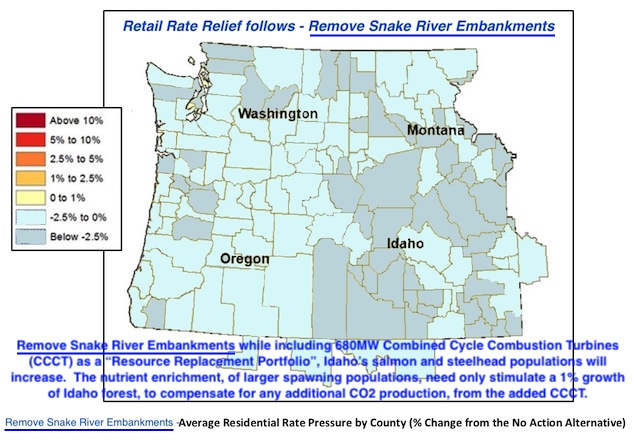forum
library
tutorial
contact

Groups Threaten Another Suit
Over River Management
by George Plaven
Capital Press, October 23, 2020
|
the film forum library tutorial contact |

|
Groups Threaten Another Suit
by George Plaven
|
"Hundreds of thousands of people in the region, including tribes, scientists, energy experts and fishing businesses,
told the agencies to remove the four dams that are causing the most harm to fish and our communities,"
-- Todd True, Earthjustice
 PORTLAND -- A coalition of environmental and fishing groups plans to again sue the federal government to protect endangered salmon and steelhead runs in the Columbia River Basin.
PORTLAND -- A coalition of environmental and fishing groups plans to again sue the federal government to protect endangered salmon and steelhead runs in the Columbia River Basin.
It is the latest chapter in a long legal fight over the management of 14 hydroelectric dams on the Columbia and Snake rivers. Built between 1938 and 1976, the dams provide flood control, irrigation, navigation and recreation benefits, while generating 8,500 megawatts on average of carbon-free power -- enough for eight cities the size of Seattle.
However, the system of dams also creates a dangerous environment for migratory salmon, groups argue, blocking access to important spawning habitat and forming large slack water reservoirs that raise water temperatures to lethally high levels during the hot summer months.
Plaintiffs, led by the Earthjustice law firm, have sued six times since 2000 seeking a remedy for fish.
The Columbia River System is collaboratively managed by the U.S. Army Corps of Engineers, Bureau of Reclamation and Bonneville Power Administration. Most recently, U.S. District Judge Michael Simon in Portland invalidated the agencies' previous operations plan in 2016, ordering them back to the drawing table.
Simon said the plan should consider more drastic measures to save fish from extinction, including possibly removing four dams on the Lower Snake River.
On Sept. 28, the agencies signed off on a new plan that calls for spilling more water over dams to boost fish migration, rehabbing wetland and riparian areas and modifying some fish passage facilities, though it stops short of breaching dams -- a move officials say would raise electricity rates, as well as transportation and production costs for Northwest farmers.
Earthjustice, representing the coalition, filed a 60-day notice of intent to sue on Oct. 22. Todd True, an attorney for the nonprofit organization, said the new plan is virtually indistinguishable from the old one, and does not go far enough to save imperiled salmon from extinction.
"Hundreds of thousands of people in the region, including tribes, scientists, energy experts and fishing businesses, told the agencies to remove the four dams that are causing the most harm to fish and our communities," True said. "But the Trump administration did not listen and rubber-stamped a plan that yet again fails to take the legally required actions necessary to protect salmon and steelhead.
Other groups involved in the filing include American Rivers, Idaho Rivers United, the Institute for Fisheries Resources, Northwest Energy Coalition, Northwest Sportfishing Industry Association, Natural Resources Defense Council, Pacific Coast Federation of Fishermen’s Associations, Sierra Club, National Wildlife Federation, Columbia Riverkeeper and Idaho Conservation League.
Brett VandenHeuvel, executive director of Columbia Riverkeeper, said the groups are calling upon Northwest governors and members of Congress to come up with a comprehensive solution to restore Lower Snake River fish runs, while balancing the interests of farms and industry.
The governors of Oregon, Washington, Idaho and Montana have announced they will work together using the goals of the Columbia Basin Partnership Task Force to rebuild 24 stocks of salmon and steelhead.
"The best solutions for the complicated problem of restoring salmon are going to come through Congress," VandenHeuvel said. "We have enough data. We have enough studies to show salmon and slipping quickly toward extinction. Now we need a comprehensive plan that will make all stakeholders in the region whole."
Kristin Meira, executive director of the Pacific Northwest Waterways Association, said that while the organization agrees strong action should be taken to support fish populations, the litigation is misguided. She said narrowing the focus of salmon recovery to removal of four Snake River dams ignores the complexity of the basin, and other threats the species face from ocean conditions and climate change.
"This lawsuit is the wrong action focusing on the wrong target and directed to the wrong jurisdiction," Meira said. "It only serves to divide the many entities that must work together, and delay the real work we must accomplish to achieve our mutual goals."
Related Pages:
Columbia, Snake River Dam Operators Must Make Plan to Keep Waters Cold Enough for Salmon Survival by Jeremy P. Jacobs, E&E News, 3/30/20
'It's Just Not Working': Republican Slams Salmon Regime by Jeremy P. Jacobs, E&E News, 3/11/20
learn more on topics covered in the film
see the video
read the script
learn the songs
discussion forum
